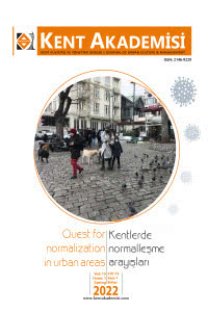Çağdaş Ahşap Yapım Sistemlerinin Çok Katlı Yapılarda Kullanımı: The Tree
21. yüzyıla gelindiğinde, artan nüfus ile birlikte yapılaşma oranı ve enerji kaynaklarının kullanımındaki artışlar sürdürülebilir yaklaşımların ortaya çıkmasına yol açmıştır. Bu durum ayrıca, yatay yapılaşmadaki alan kısıtlılığı ile birleşerek, düşeyde yükselmeyi gerektirmiştir. Günümüzde yaşanan teknolojik gelişmelerin etkisinde, düşey yapılaşmada yenilikçi çözümlerin kullanıldığı görülmektedir. Sürdürülebilir ve gelişime açık, hızlı yapım kolaylığı ile “ahşap yapım sistemi” bu anlamda ön plana çıkan yenilikçi sistemlerden biridir. Çapraz Tabakalı Ahşap (Cross Laminated Timber-CLT) adı verilen ahşap yapım sistemi, günümüzde kuzey ülkelerinde sıklıkla kullanılan bir yapım sistemidir. Öte yandan, hafiflik, uygulama kolaylığı gibi özelliklerine ve mevcut hammadde stoku potansiyeline rağmen ahşabın, Türkiye’de inşaat sektöründe yapım sistemi olarak kullanımının az olduğu bilinmektedir. Yapılan çalışma ile bu anlamda ahşap yapım sisteminin Türkiye’de yapıda kullanımının yaygınlaştırılmasına katkı sağlanması amaçlanmıştır. Bu anlamda çalışmada, Norveç’te CLT sistemi ile üretilen ve yapıldığı dönemin en yüksek yapısı olan The Tree yapısı incelenmiştir. Çalışmada ilk olarak; ahşap yapı malzemesi ve yapım sistemleri aktarılmış, ahşabın sürdürülebilir yönleri, olumlu ve olumsuz özellikleri ele alınmıştır. Sonrasında, The Tree yapısı ve yapım sistemine yönelik bilgilere yer verilmiştir. Yapıya yönelik bilgilerin edinilmesinde; Norveç Bergen Kenti Hordaland Bölgesi’ndeki yapı yerinde gözlenmiş; proje müdürü eşliğinde proje detayları yapı üzerinde tartışılmıştır. Bunun yanı sıra, yapı hakkında günümüze kadar yapılmış çalışmalar incelenmiştir. Yapılan çalışma ile çağdaş ahşap yapım sistemlerinin Türkiye’de düşey yapılarda nasıl kullanılabileceği görülmüştür.
Anahtar Kelimeler:
Sürdürülebilirlik, ahşap yapı, çağdaş ahşap yapım sistemi, CLT, The Tree
An Investigation of the Contemporary Wooden Construction Systems Usage in Multi-Storey Buildings: The Tree
By the 21st century, increasing in the population, increasing in higher constructions and the use of energy resources, led to the emergence of sustainable approaches for new buildings. In this situation, with limited space in the horizontal level, makes it neccesary to go vertical. Innovative solutions are used in vertical construction as a result of technological developments. Sustainable and open to development, with the benefit of rapid construction, the “wood construction systems” are one of the innovative system that stand out in this sense. The wooden construction systems, called Cross Laminated Timber (CLT) and Glulam Timber, are construction systems these are frequently used in northern countries today. On the other hand, even the light weight, ease of application, industrial potential and despite the current stockpile of wood in Turkey, its use as a production system in the construction sector in Turkey is known to be limited. With this study, making contemporary wooden construction systems common in the construction sector in Turkey is the aim. Due to this, The Tree structure, which was produced with the glulam and CLT systems in Norway and which is the highest structure of the period it was built, was examined. In obtaining information about the building; It was observed at the construction site in Bergen, City of Hordaland Region, Norway. The project details were discussed with the project manager. In addition, studies on the structure have been examined. Firstly; properties of wood material and its usage as a contemporary construction system are discussed and various examples from the past and present are given. Afterwards, wood and wood structure has been examined in Turkey. The study has been completed with the section where the information about The Tree structure and construction system has been transferred. Studies of contemporary timber construction systems are exemplified how to use vertical structure in Turkey.
Keywords:
Sustainability, contemporary wooden construction system, cross laminated timber (CLT), The Tree,
___
- ABRAHAMSEN, R. B. (2015). First 14-Storey Wood Building in the World at Bergen in Norway. 5th Forum International Bois Construction FBC 2015.
- AKÇA, C., AKARCA, H., ERDOĞMUŞ, E. ve DEMIREL, A. (2014). Ulusal Ahşap Birliği. UAB.
- AKSOY, D. ve AHUNBAY, Z. (2005, Mart). Geleneksel ahşap iskeletli Türk Konutu’nun deprem davranışları. İtü Dergisi, 4(1), 47-58.
- BRANCACCIO, F. (2018). Çağdaş Yapılarda Ahşap: Kullanım ve Yeniden Kullanım. Ahşap Yapılarda Koruma ve Onarım Sempozyumu 4 (s. 178-198). İstanbul: İstanbul Büyükşehir Belediyesi KUDEB.
- BRANDNER, R., FLATSCHER, G., RINGHOFER, A., SCHICKHOFER, G. ve THIEL, A. (2015). Cross Laminated Timber (Clt): Overview And Development. European Journal Of Wood Products.
- FLEMING, P., SMITH, S. ve RAMAGE, M. H. (2014). Measuring- Up İn Timber: A Critical Perspective On Mid-And High-Rise Timber Building Design. Architectural Research Quarterly, 18-01, 20-30.
- GÜZEL, N. ve YESÜGEY, S. C. (2015). Yapı Teknolojisi Ve Malzeme Çapraz Lamine Ahşap (Clt) Malzeme İle Çok Katlı Ahşap Yapılar. Mimarlık, 382.
- HASOL, D. (2017). Ansiklopedik Mimarlık Sözlüğü (15.Baskı b.). İstanbul: Yem Yayın.
- KLEPPE, O. H. (2017). The Tree- Dünyanın En Yüksek Ahşap Binası. Ahşap Yapılarda Koruma ve Onarın Sempozyumu 5 (s. 193-207). İstanbul: İstanbul Büyükşehir Belediyesi KUDEB.
- MALO, K. A., ABRAHAMSEN, R. B. ve BJERTNAES, M. A. (2016). Some Structural Design İssues Of The 14 Storey Timber Framed Building ‘‘Treet’’ İn Norway. European Journal Of Wood And Wood Products, 407-424. doi:10.1007/S00107-016-1022-5
- RAMAGE, M., FOSTER, R., SMITH, S., FLANAGAN, K. ve BAKKER, R. (2017). Super Tall Timber: Design Research For The Next Generation Of Natural Structure. The Journal Of Architecture, 22:1, 104-122. doi:Doı: 10.1080/13602365.2016.1276094
- URL 1 https://insapedia.com/capraz-lamine-ahsap-teknolojisi-clt-cross-laminated-timber/ (Erişim T: 24.07.2019)
- URL 2 http://www.ahsap.org/assets/pdfDocs/etkinlik-2/Ahsap-Yapi-Sektor-Raporu-2.pdf (Erişim T: 29.04.2019)
- ISSN: 2146-9229
- Yayın Aralığı: Yılda 4 Sayı
- Başlangıç: 2008
- Yayıncı: Karadeniz Yazarlar ve Şairler Derneği
Sayıdaki Diğer Makaleler
Bisiklet ve Yaya Ulaşımının Milli Parklarda Karbon Ayak İzi Etkilerinin Araştırılması
Kentsel Dönüşüm ile Sürdürülebilir Kent Önerileri ve Selamsız Örneği
Çağdaş Ahşap Yapım Sistemlerinin Çok Katlı Yapılarda Kullanımı: The Tree
Nurcan GÜL, Seher GÜZELÇOBAN MAYUK
6360 Sayılı Kanun ve Bu Kanunun Eleştirisi: Merkeziyetçilikten Yeniden Merkeziyetçiliğe
Kent Parklarının Kullanıcı Memnuniyeti Açısından İrdelenmesi: Çanakkale Örneği
Deniz Taşımacılığında Risk Sermayesi
İstanbul’daki 16-18. Yüzyıllara Ait Medreselerin Mevcut İşlevlerinin Koruma Amaçlı Değerlendirilmesi
